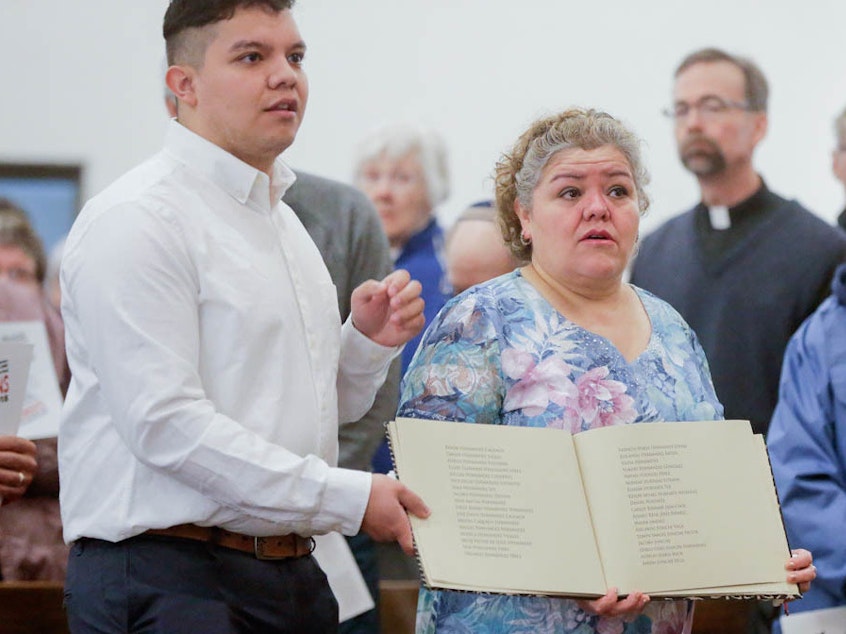When His Mom Was Deported In 2008, A Certainty Shattered: 'Where Is Home?'

Pedro Lopez was in seventh grade when a rumor began to spread through his school in 2008: Immigration and Customs Enforcement agents were raiding Agriprocessors, the meatpacking plant where his parents worked, in his small hometown of Postville, Iowa.
Soon, Lopez would learn that his mother was among the nearly 400 workers detained at the plant in one of the largest workplace raids in the U.S.
"It was just shattering," said Lopez, now 24, looking back on his family's separation at StoryCorps earlier this month. "When I said goodbye to her that morning, I didn't realize I was gonna say goodbye for a year."
That May morning, Lopez remembers seeing an ominous sight of helicopters circling above.
"The day of the raid, we noticed that there was a helicopter kind of flying around that didn't belong in the rural country sky," he said.
Sponsored
But the real worries didn't set in for Lopez until his reading teacher confirmed the rumor; something had happened at the Agriprocessors plant.
"Immediately after that, I realized that my mom was working," he recalled. "I didn't know what to do. I didn't know what to think."
During the Agriprocessors raid, ICE arrested 389 people, mostly from Guatemala and Mexico.
Lopez's mother, Consuelo, was one of nearly 300 people who received jail time for identity fraud. Faced with the threat of at least two years of imprisonment, most of the detainees accepted plea agreements.
Lopez wouldn't see his mom again for over a year after she was detained and deported. She passed through multiple detention centers in several states over the course of five months, but Lopez thought it would be too upsetting to visit her in prison. She was deported to Mexico that October.
Sponsored
Life changed in other dramatic ways after the raid.
"I remember that we'd stay home from school and hid in in our basement, because there were stories of agents coming to the house and arresting the second parent or whoever answered the door," he said. "We decided that the best thing to do was just close our home and not let anything in."
Pedro's father, Pedro Lopez Valdez , worked in maintenance at Agriprocessors and, like Consuelo, was in the U.S. illegally. He quit his job because he was afraid of subsequent ICE raids.
"We went from having a steady life to one that we wouldn't know what was gonna happen the next hour," Lopez said. "I remember having to go and ask one of our neighbors if we could have water from their house because we didn't have enough money to pay the water bill."
Those feelings of insecurity in a place he called home prompted Lopez to wonder whether he belonged in Postville.
Sponsored
"For me, Postville, Iowa, was our little slice of home, but then I realized: is it my home? Or, where is home?"
Pedro says that there were often rumors swirling about potential ICE raids. But Postville felt like a "bubble" founded by immigrants and populated by immigrants, and he said he never thought a raid would actually happen.
Ever since the raid, Lopez says, he's on guard. "During that time, and even more now, I'm always skeptical about anything," he said.
Consuelo was eventually granted a visa to return to the U.S., and was finally reunited with the family after Pedro's older sister, Juana, drove to Texas to pick her up and bring her back to Postville. Lopez remembers that after she walked through the door, "I heard my father just break down a little bit and the muffled cry from him as he hugged my mom."
"That sad episode in our lives is behind us," Lopez said, "but, it's never gone."
Sponsored
Lopez, now a permanent resident as are Juana and his parents, lives in Minneapolis. He is working toward becoming an immigration lawyer. As he studies for the LSAT, he's in the process of applying for citizenship.
Audio produced for Morning Edition by Camila Kerwin.
StoryCorps is a national nonprofit that gives people the chance to interview friends and loved ones about their lives. These conversations are archived at the American Folklife Center at the Library of Congress, allowing participants to leave a legacy for future generations. Learn more, including how to interview someone in your life, at StoryCorps.org. [Copyright 2019 NPR]

